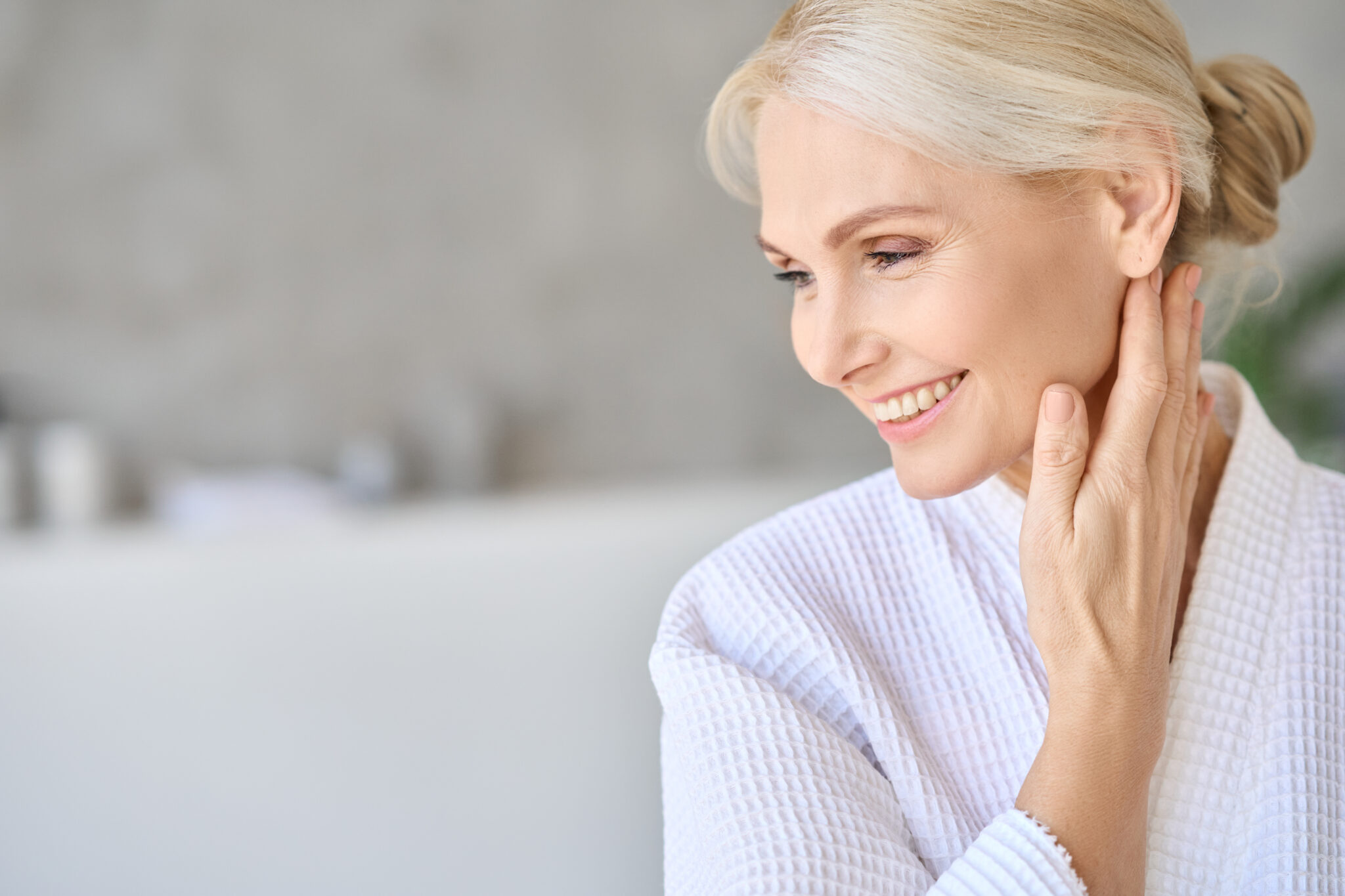No items found.

Menopause, which officially begins one year following your last menstrual period, is a natural part of a woman’s life cycle that generally occurs around ages 47 to 55. Unfortunately, menopause comes with some additional body-related changes. As menstruation stops, so does the supply of hormones associated with it, leading not only to the natural end of your fertility, but also several additional bodily changes. Menopausal skin is one of the most noticeable side effects that can feel hard for many people to manage along with so many other changes. However, there are several ways to address menopausal skin in a way that not only mitigates its overall effects, but also sets you up for healthy skin for years to come.
During menopause, your body lowers its production of estrogen to naturally “turn off” your fertility. However, estrogen also plays a role in other aspects of your body and your looks, not just your reproductive system. As a result, people experience a variety of skin-related menopausal symptoms, the most common of which is dryness.
Throughout menopause, which lasts from four to seven years, the skin will also go through additional changes because of its sudden lack of estrogen, including thinning out, losing volume, and bruising more easily. Skin wrinkling and laxity can also become more apparent due to diminishing supportive proteins in the skin and underlying facial volume loss.
The best way to mitigate the most noticeable effects of menopausal skin is to take a two-pronged approach, which combines a targeted at-home skincare routine with select professional treatments designed specifically to address the common issues associated with menopause.
Professional laser therapies can help you manage a variety of issues associated with menopausal skin, including facial wrinkling, discoloration, and increased facial hair. One type of effective laser therapy for menopausal skin is called intense-pulsed light, or IPL, treatment. During this virtually painless non-invasive procedure, practitioners will use a wand to deliver intense pulses of light to the skin using a wide spectrum of wavelengths.
IPL treatments are especially effective at addressing skin discoloration, including age spots and sun damage, as well as helping get rid of unwanted facial hair. These conditions are often associated with menopausal skin. More definitive treatments for facial wrinkling include ablative lasers- most common being a CO2 laser that helps resurface the skin and stimulates new and stronger collagen production. Consult with your provider if you are an ideal candidate for this procedure as it is more aggressive than the IPL treatments and thus the recovery is longer.
Another minimally invasive and virtually painless aesthetic treatment that pairs well with menopausal skin is microneedling. Using a wand equipped with dozens of small, microscopic needles, practitioners create tiny puncture wounds across targeted areas in the face, activating the body’s immune response. As a result, your body will work to “repair” this damage by producing collagen and elastin, effectively increasing volume and eliminating the appearance of fine lines and wrinkles in those targeted areas.
While professional treatments for menopausal skin can make a big difference in your overall appearance, these procedures will have the greatest effect if you pair them with at-home regimens designed to address the issues common with menopause and skin. This includes both established skincare routines as well as introducing targeted products that mainly focus on moisturization and minimizing UV radiation exposure.
Caring for your skin is more important than ever during menopause. Implementing a solid skincare routine that incorporates anti-aging products and targets problem areas is essential. Minimally, this should include daily cleansing and intense moisturizing, which helps to manage the dryness associated with menopausal skin. In addition, it’s essential to incorporate products that contain retinol or peptides to help plump the skin and maintain the structural proteins in your skin. Make sure you notice and address any irritation by using fragrance-free products when necessary.
In addition to covering the basics, many folks find that the changes their skin undergoes during and after menopause are highly personal. Indeed, everyone will experience this cycle of life differently due to their genetics and environmental factors. In every case, consulting with a skincare professional and designing a custom routine with products you choose to target your specific concerns can make all the difference.
While the work you do at home and with your professional skincare team has a huge effect on the look and condition of your skin during and after menopause, you can take additional steps in terms of adjusting your lifestyle that will also have a net positive effect on your skin health over time. The possibilities include:
At The Rejuva Center at Williams in Albany, NY, our experienced aesthetic skincare professionals have decades of combined experience working with patients learning to navigate the ups and downs of menopausal skin. From treatments such as laser therapy and microneedling to targeted skincare products designed to address all your specific needs, we can help you come up with a skincare solution that keeps your menopausal skin shining. Contact us today to schedule a consultation and learn more.